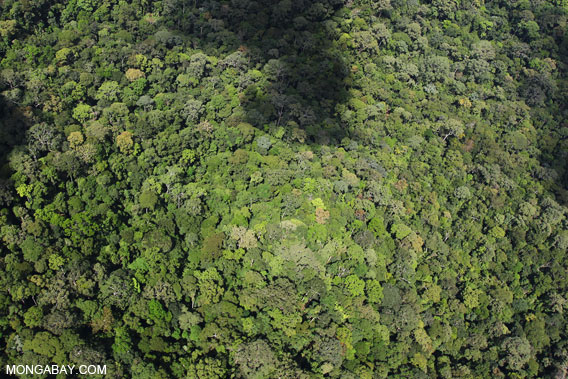
Rainforest in Borneo.
A ruling by Indonesia’s Constitutional Court could shift some forest management authority from the country’s powerful Ministry of Forestry to local governments, say forestry experts.
The “MK45” case centered around the central government’s control over Indonesia’s Forest Zone (Kawasan Hutan), a classification that applies to more than two-thirds Indonesia’s landmass or roughly 130.7 million hectares. Five district heads in Central Kalimantan challenged the designation of their administrative districts as Kawasan Hutan, which required their constituents — hundreds of thousands of people who live in the designated Kawasan Hutan areas — to seek permission from Ministry of Forestry whenever they wanted to make land use decisions. The Constitutional Court ruled that some of language underpinning Ministry of Forestry’s control over Kawasan Hutan is “unconstitutional” and “unenforceable”.
The decision, reached last month, throws into question the fate of some 116.2 million hectares of Kawasan Hutan that has yet to be formally gazetted.
“The implications of the ruling are potentially profound, raising questions concerning: (i) the current extent and legal status of the Kawasan Hutan, (ii) the future ability of the Ministry of Forestry to exert management authority over it, and (iii) changes to the formal and informal balance of power between central and regional government authorities in determining the allocation of land to forestry versus non-forestry purposes within provincial spatial plans,” stated an analysis issued by a group of experts from Daemeter Consulting, Tropenbos International (Indonesia) and the law firm Makarim & Taira S. “This appears at first glance to imply the Kawasan Hutan existing prior to the MK45 decision is now legally reduced to 14.2 million ha, or 10% its previous extent.”
While there remains considerable uncertainty about the impacts of the ruling, it seems to establish a moratorium on the issuing of any new licenses by the Ministry of Forestry until gazetting has been carried out. Existing licenses are still valid however.
What the decision means for forests in Indonesia is unclear. Daemeter says local officials may attempt to issue licenses for oil palm plantations in areas zoned for forests. At the same time however, the ruling could lead to greater coordination between the central government and local authorities. Until now, forest management decisions have at times been handed down from the top, sometimes resulting in conflict and mismanagement. Control over a vast land bank has also made the Ministry of Forestry immensely powerful.
The analysis explains the outcome of the MK45 case further:
-
The “worst case” scenario includes protracted disagreement between MoF and regional authorities over land allocation, leading to continued delays in finalizing provincial spatial plans, coupled with complications to the gazettal process. This would risk uncontrolled degradation of forests, reduced investment security in forestry, increased social conflict, and constraints on the ability of Indonesia to achieve its low emissions high growth (7/26) objectives. A “best-case” scenario would be that it creates a new opportunity for a rational, consensus-based approach to spatial planning that maximizes positive outcomes for forests, peatlands, economic development, and community rights. The net effect could be an optimization of the forestry sector including REDD+ projects, rehabilitation and community-based forestry leading directly to the promotion of forestry as a key element of the national government’s 7/26 green growth development objectives.
Local governments seem to already be positioning themselves to take advantage of the potential power shift — authorities in North Sumatra recently said they will propose reducing the area of Kawasan Hutan by 1.2 million ha.
Related articles














